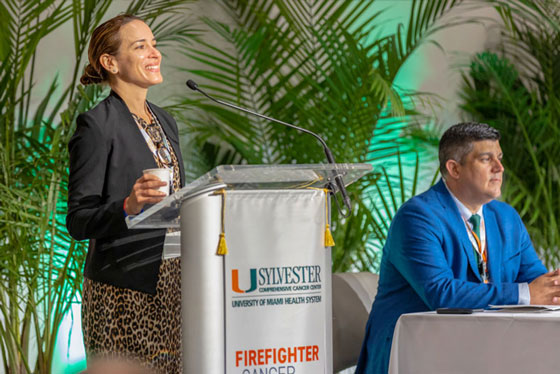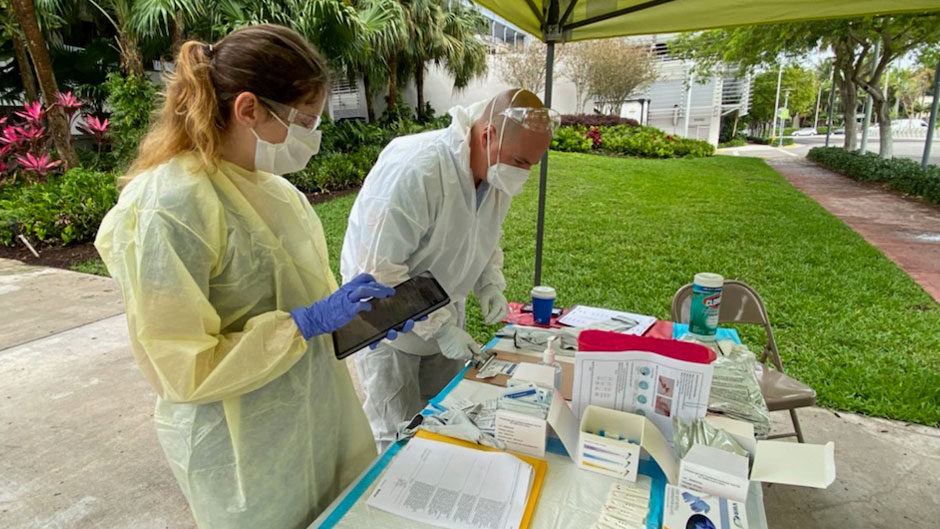When Miami-Dade County leaders set out to quantify the extent of COVID-19 infection in the county, they tapped researchers from Sylvester Comprehensive Cancer Center at the University of Miami Miller School of Medicine to lead this effort.
Erin Kobetz and Alberto Caban-Martinez are the director and deputy director, respectively, of Sylvester’s Firefighter Cancer Initiative. They are applying their expertise from earlier research that assesses the burden of cancer among first responders to providing a better picture of how many people in Miami-Dade have been infected with the novel coronavirus.
Miami-Dade already has more confirmed cases than any other county in Florida. Experts believe the number of infections is higher than what’s being reported.
“We are likely significantly underestimating disease prevalence, with potentially eight to 10 people actually infected for every single positive test reported in daily statistics,” said Kobetz. “With limited testing availability, we are largely moving in the dark in terms of understanding what is happening locally, including the proportion of asymptomatic individuals who are positive, and how the curve of infection may change as social distancing and stronger shelter in place initiatives are widely practiced.”

She points out that this “community surveillance” for COVID-19 that the county is instituting is the first of its kind nationally and incredibly important for a successful public health response. It's called SPARK-C, which stands for Surveillance Program Assessing Risk and Knowledge of Coronavirus.
The nasal swab test currently used for screening detects the actual virus and is considered the gold standard when making clinical decisions. This new public health surveillance effort will employ a different kind of test using a drop of blood from a fingertip to check for antibodies to the virus, which signal past or present infection. The company that makes this serologic test has an emergency use application under review by the federal Food and Drug Administration.
Miami-Dade County Mayor Carlos A. Gimenez purchased 10,000 kits to test random cross sections of the county’s population. Florida Power & Light is helping with the process of randomly selecting addresses. Those residents will receive a recorded call from Gimenez, asking if they would like to participate. Those who are interested in volunteering will call a number dedicated to the SPARK-C initiative.
“The phone line will be staffed by public health and medical students from the University of Miami who speak English, Spanish, and Creole,” said Caban-Martinez. “These students will conduct an initial screening and then will schedule the volunteers who consent to one of 10 testing sites designated solely for this community initiative.”
Members of the county’s Emergency Medical Services Ocean Rescue will be administering the finger-prick test. Results will be provided to participants the next day. The Sylvester research team will be collecting and analyzing the data.
“I think we will learn a lot about how COVID-19 is affecting our local community—whether certain geographies and/or population sub-groups have a greater infectivity rate—and most importantly, what to do about it now and in the future,” said Kobetz. “And, I think doing this work in South Florida, given our significant diversity, will offer critical lessons learned for the broader U.S. and Western Hemisphere. Our data can drive local and global solutions.”
Some of the test kits will also be used to assess infection among first responders in Miami-Dade County and the homeless population.
“The rapid spread of COVID-19 throughout the world and our country has forced us to figure out new ways to collaborate,” said Gimenez. “In our community we are proud to often engage in public-private partnerships, and this testing program is an outstanding example of this. With our combined efforts, we look forward to applying what we can learn from this study and, hopefully, help bring an end to this public health crisis.”

